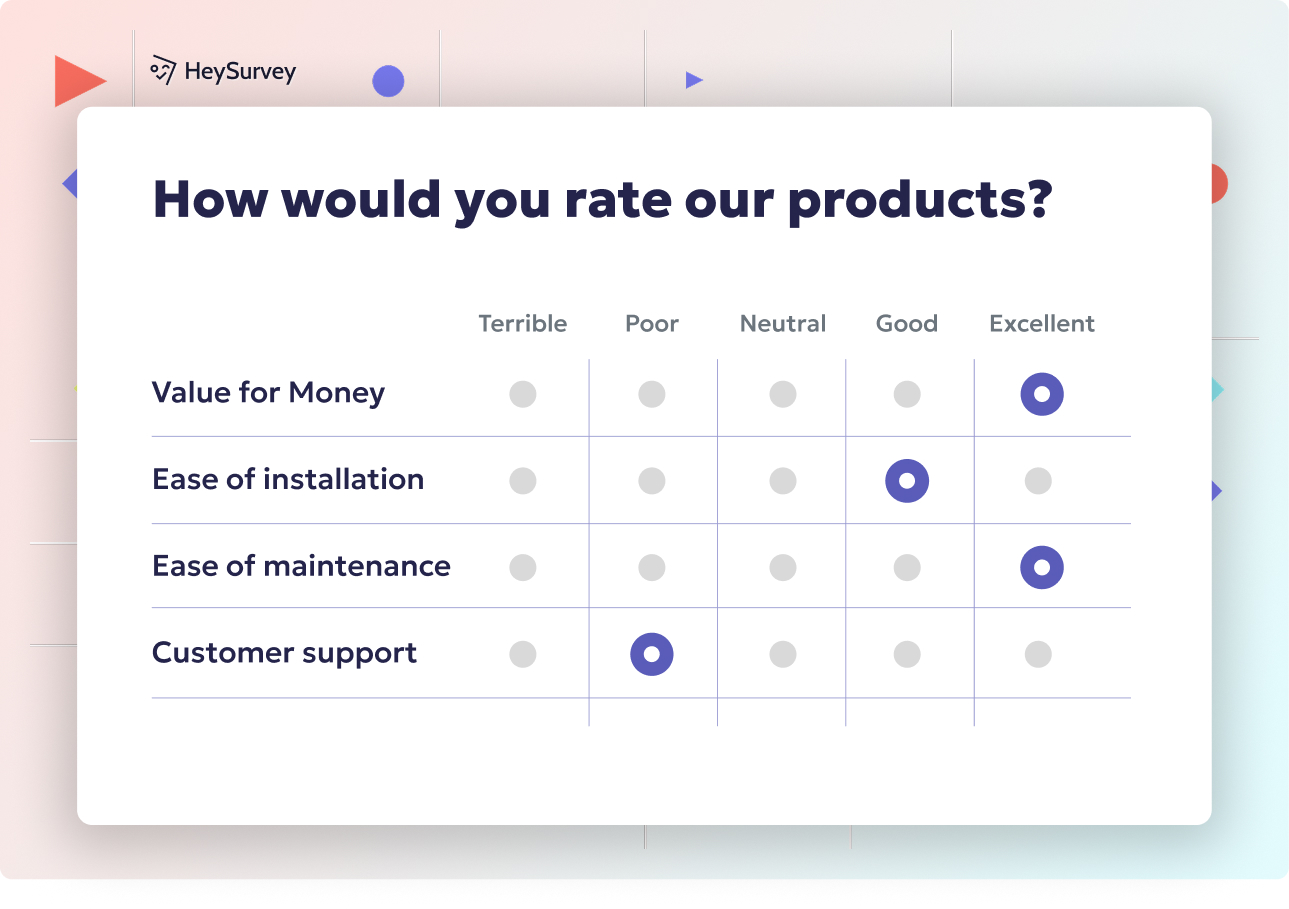29 Psychology Survey Example Questions & Best Practices Guide
Explore 25 expert psychology survey example questions covering personality, mental health, motivation, and more for reliable research insights.
Psychology surveys are like secret passageways into the human mind, unlocking valuable answers for researchers, HR teams, educators, product designers, and clinicians alike. The difference between a yawning respondent and an engaged one? It all comes down to asking the right questions. That’s why a well-built psychology survey—using the perfect blend of formats—boosts accuracy, raises completion rates, and polishes data reliability. Whether you’re after personality traits, mental health snapshots, or the quirks of decision-making, carefully selected prompts make "psychology survey questions" and every "sample psychology questionnaire" a powerhouse tool for "psychological research surveys."
Personality Trait Surveys (e.g., Big Five, HEXACO)
Purpose & Typical Use-Cases
Spotting the subtle threads of personality traits helps us predict actions, nudge cultural fit, and crack open learning styles. Tools like the Big Five and HEXACO aren’t just academic—they pave the way for real-world decisions. In the workplace, these surveys help uncover who might thrive in a bustling office and who prefers a quiet nook.
Researchers lean on these tools to track changes over time, while HR wizards wield them to shape teams brimming with collaborative flair. Product designers peek at these results to build experiences that actually resonate with their audience.
- Key groups who use these surveys:
- Recruiters scouting for cultural fit
- Coaches mapping growth paths
- Educators customizing instruction
Why & When to Use This Survey Type
Personality trait surveys shine when you want lasting, not fleeting, insight. They’re best used at the start of a new role, the launch of a coaching project, or sprinkled through a longitudinal research study. You won’t get a day-to-day mood read—but you will spot patterns that stick.
Go for this survey if:
* You need stable, long-term predictions, not momentary moods
* You’re creating individualized development or onboarding programs
* You’re charting personality against performance or well-being
5 Sample Questions
I see myself as someone who is talkative and outgoing.
I remain calm in stressful situations.
I get chores done right away.
I sympathize with others’ feelings.
I have a vivid imagination.
Each question lets you unpack specific personality dimensions. Used wisely, these “psychology survey questions” can transform abstract traits into actionable insights!
The HEXACO Personality Inventory-Revised (HEXACO-PI-R) offers 100-item and 60-item versions, each available in self-report and observer report forms, to assess six major personality dimensions. (hexaco.org)
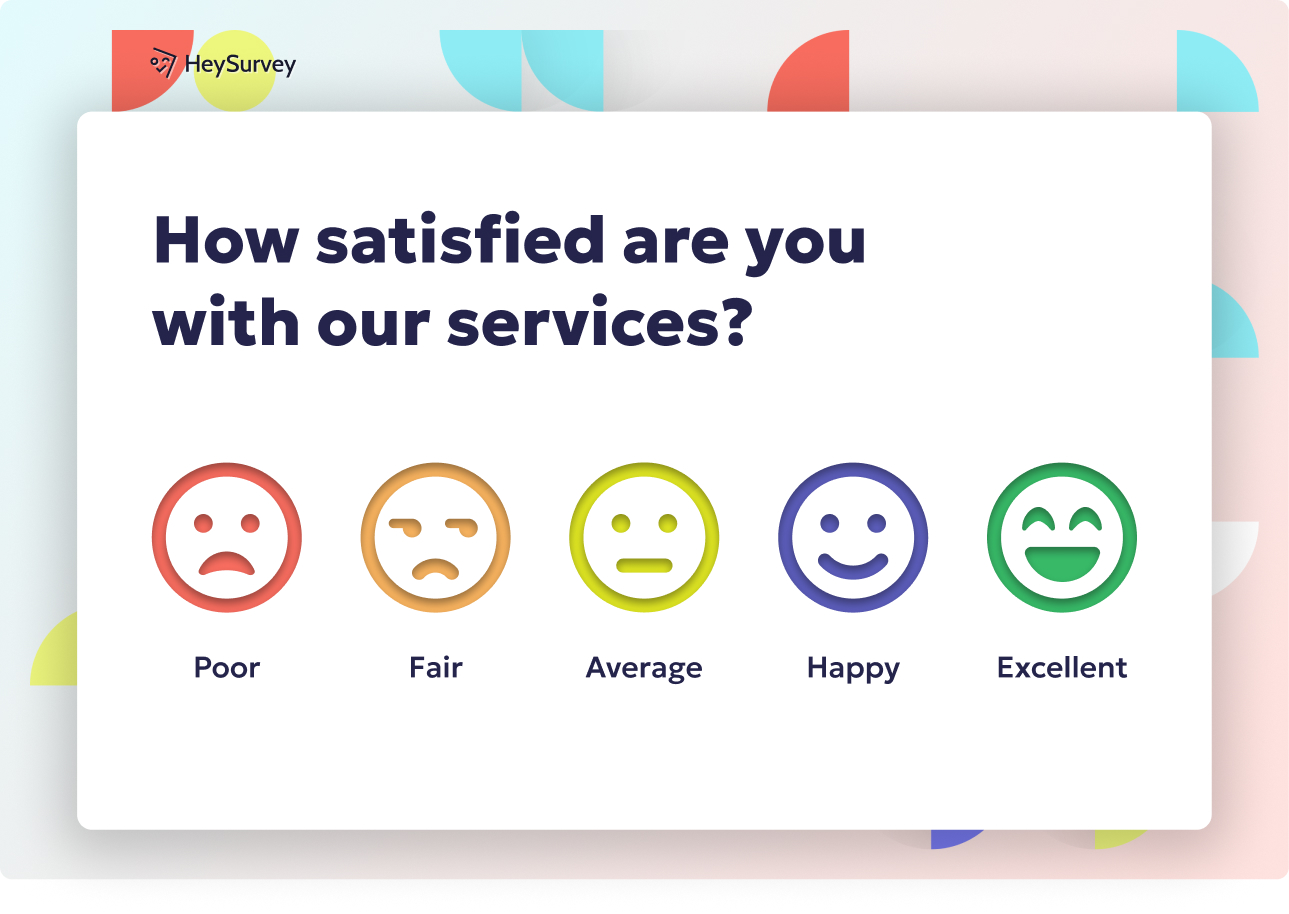
Here’s how to create your psychology survey with HeySurvey in just a few easy steps:
Step 1: Create a New Survey
Head over to HeySurvey and kick things off by creating a new survey. You can start from scratch with an empty sheet or grab one of our ready-made templates designed just for psychology surveys. If you want a quick start, clicking the button below this guide will open a template tailored to your needs.
Step 2: Add Questions
Now it’s time to build your questionnaire. Click Add Question to insert the types of questions you want — from multiple-choice scales to open text. Simply input your psychology survey questions, set response options like Likert scales, and mark important items as required to ensure you catch every crucial detail. You can also add images or descriptions to clarify complex prompts.
Step 3: Publish Your Survey
Once your questions are set, preview the survey to make sure it looks perfect. When you’re happy, hit Publish to get a shareable link that you can send out or embed on your website. Just remember, you’ll need a HeySurvey account to publish and track responses.
Bonus Step 1: Apply Branding
Make the survey yours by uploading your logo and customizing colors, fonts, and backgrounds in the Designer Sidebar. Eyecatching branding keeps respondents engaged and boosts your survey’s professionalism.
Bonus Step 2: Define Settings
Control your survey’s timeline by setting start and end dates, limit the number of responses, or add a redirect URL to guide participants after completion. You can also decide if respondents see results, perfect for transparent feedback loops.
Bonus Step 3: Use Branching Logic
Get fancy with branching and tailor the survey path based on how people answer previous questions. This delivers a personalized experience, asking only relevant follow-ups and avoiding survey fatigue.
Ready to try? Use the button below to open your psychology survey template and start gathering insightful data with HeySurvey today!
Mental Health Screening Surveys (Depression & Anxiety Scales)
Purpose & Typical Use-Cases
Mental health screening surveys act as gentle radar, picking up early signals of depression, anxiety, or burnout. They aren’t meant to diagnose, but they provide essential clues for deeper follow-up. In offices and clinics alike, a few thoughtful prompts may open the door to necessary support.
Organizations use these scales to spot the first hints of trouble, keeping well-being programs sharp and timely. Clinicians rely on them before therapy starts, while researchers chase trends in employee or student populations. They turn "How are you?"—a question loaded with expectations—into something measurable and real.
Core uses for these surveys include: * Pre-therapy assessments * School and workplace wellness checks * Epidemiological studies and mental health research
Why & When to Use This Survey Type
Bring out these survey questions before intake appointments or at pivotal work-life moments. They’re prime for onboarding in wellness initiatives, the launch of stress-reduction programs, or when unexplained absenteeism crops up.
Reach for mental health scales when:
* You need early warning signs for depression, anxiety, or burnout
* You want to track outcomes after intervention
* Confidentiality and sensitivity are paramount
5 Sample Questions
Over the past two weeks, how often have you felt little interest or pleasure in doing things?
How often have you felt nervous, anxious, or on edge?
How frequently have you had trouble falling or staying asleep?
Have you experienced feelings of worthlessness or excessive guilt?
How often have you found it difficult to concentrate on daily tasks?
Well-chosen mental health screening "sample psychology questionnaire" prompts create space for honesty, making invisible struggles visible.
The Patient Health Questionnaire-9 (PHQ-9) is a validated tool for assessing depression severity, with a sensitivity of 88% and specificity of 88% for major depressive disorder. (aafp.org)
Stress & Coping Style Surveys
Purpose & Typical Use-Cases
Stress and coping style surveys zoom in on how people experience and manage tension. These powerful little tools pull double duty—quantifying overall stress, while spotlighting how someone copes (or, let’s be honest, just copes by watching cat videos).
Educators deploy them before finals or big projects to see who needs extra support. Companies use them to gauge pulse during mergers or crunch times, while clinicians watch for signals of unhealthy coping habits. Every answer helps identify whether someone’s toolbox is full of duct tape or diamond-tipped drills.
Common use-cases:
* Before launching wellness programs, to identify high-needs groups
* During high-stakes periods—think looming exams or office overhauls
* As follow-ups after major life changes (moving, divorce, job loss)
Why & When to Use This Survey Type
Opt for stress and coping surveys whenever the air feels thick—before, during, or after life’s speed bumps. They're perfect for check-ins during periods of expected heightened pressure. If your aim is to help people not just survive but actually thrive, these surveys bring clarity to emotional weather forecasts.
Best times to use:
* Before stress management training
* After major life events, to measure recovery
* Ongoing in high-pressure environments for early intervention
5 Sample Questions
In the last month, how often did you feel unable to control important things in your life?
When problems arise, I actively seek solutions rather than avoid them.
I use relaxation techniques (e.g., deep breathing) to manage tension.
How often do you turn to friends or family for emotional support?
Rate your overall stress level during the past seven days.
Spot-on "psychological research surveys" for stress and coping cut through the fog, giving clear signals for both prevention and care.
Motivation & Goal Orientation Surveys
Purpose & Typical Use-Cases
Understanding motivation is like discovering what fuels a rocket—intrinsic vs. extrinsic motivators tell you whether to offer a pep talk, a trophy, or both. These surveys help tease apart mastery-driven learners from those who chase after the next gold star.
Educators wield them to untangle study habits, while sales leaders use them to build unstoppable teams. From product adoption studies to onboarding new hires, knowing what drives someone isn’t just nice—it’s the key to meaningful change.
Surprising uses:
* Academic research for learning approach analysis
* Sales and performance training
* New product rollout and employee incentives
Why & When to Use This Survey Type
Pull out motivation surveys when you want to pinpoint what gets people out of bed (or keeps them hitting snooze). They're great for evaluating team dynamics, planning recognition programs, or powering up user adoption campaigns.
When to choose this type:
* Before training and professional development initiatives
* During academic research on student achievement
* Onboarding, to sync rewards with actual drivers
5 Sample Questions
I prefer challenging tasks that help me learn new things.
Receiving public recognition motivates me to perform better.
I set specific, measurable goals for myself.
Failure encourages me to improve rather than give up.
Monetary rewards increase my willingness to exert extra effort.
Motivation and goal orientation "psychology survey questions" flip on the lights for what makes people tick—from quiet satisfaction to standing ovations.
The Goal Orientation Questionnaire (GOQ) effectively distinguishes between learning and performance goal orientations, aiding in understanding individual motivation patterns. (ncbi.nlm.nih.gov)
Emotional Intelligence (EI) Surveys
Purpose & Typical Use-Cases
Emotional intelligence (EI) surveys measure the magic sauce in team alchemy—the ability to sense, express, and manage emotions. If teams are the engine of progress, EI is the oil that keeps things running quietly (and avoids sudden breakdowns).
Great for leaders and customer service pros, these surveys set the tone for harmonious workplaces and resilient relationships. They reveal who can navigate tricky conversations and who can turn tension into collaboration.
Prime uses:
* Leadership development callouts and workshops
* Conflict-resolution exercises
* Customer service screening and support roles
Why & When to Use This Survey Type
Choose an EI survey when you want to build—or fix—a team. They work wonders in leadership pipelines, conflict prevention, or any setting where understanding feelings fuels performance. For anyone who needs to “read the room,” these questions are gold.
Use these tools:
* When building emotionally savvy teams
* Before promotions or job fit analysis
* During training for managers and frontline staff
5 Sample Questions
I can quickly sense when someone on my team is upset.
I find it easy to discuss my feelings with others.
I stay positive even when faced with significant obstacles.
I adapt my communication style to others’ emotional states.
I use emotions to motivate myself toward achieving goals.
High-quality "sample psychology questionnaire" items for EI make emotional skills visible—and, with practice, stronger.
Social Attitudes & Behavioral Intention Surveys
Purpose & Typical Use-Cases
Social attitudes and behavioral intention surveys peek under the hood of what we really think, value, and might do in sticky situations. They help measure invisible forces like prejudice, altruism, and openness—crucial for policy shapers, marketers, and community leaders.
Organizations deploy these tools to anticipate reactions ahead of social campaigns or spot friction in cross-cultural environments. Research teams use them to help map attitudes before big events or to forecast the ripple effects of new policies.
Popular use-cases include:
* Social-impact and awareness campaign planning
* Tracking shifts during political polling
* Exploring cultural adaptation in global organizations
Why & When to Use This Survey Type
Bring out social attitude surveys before you roll out new messaging or policies. These prompts are pitch-perfect for polling public opinion, recruiting for diversity initiatives, or understanding group conformity within organizations.
Spot-on moments:
* Before launching inclusion or anti-bias trainings
* In the run-up to elections or policy releases
* During cross-cultural studies and assimilation programs
5 Sample Questions
I am willing to pay more for products that are environmentally friendly.
Most people who receive government aid are taking advantage of the system.
I would intervene if I witnessed bullying in public.
How comfortable are you with working closely with individuals from different cultural backgrounds?
I often adjust my opinions to match those of the group.
When crafted with care, "psychology survey questions" on social attitudes and behavior truly reveal the wind’s direction—long before it makes headlines.
Cognitive Bias & Decision-Making Surveys
Purpose & Typical Use-Cases
Cognitive bias and decision-making surveys pull back the curtain on shortcuts and sneaky pitfalls in how we think. These questions catch heuristics like confirmation bias or loss aversion in action—transforming foggy thinking into patterns that can be measured and improved.
Their uses stretch from UX labs to financial advising to risk assessment in policy-making. When testing new products or analyzing how consumers choose, these surveys show which mental hacks help—and hurt—our decisions.
Popular contexts:
* Product and user experience testing
* Financial planning and risk evaluation
* Consumer behavior research and habit tracking
Why & When to Use This Survey Type
Deploy these questions when you’re looking to unmask hidden decision drivers. They're a must-have for consumer studies, change management projects, and anywhere intuition can trip rationality.
When to use this survey:
* During product launch or revision planning
* In scenarios that explore habit change or market adoption
* Anytime you suspect biases may shape critical outcomes
5 Sample Questions
When making a purchase, I focus more on potential losses than gains.
I seek information that supports my initial beliefs.
I rely on the first piece of information presented when deciding.
I overestimate my ability to predict future events.
I prefer options that maintain the status quo over change.
With "psychological research surveys" on cognitive bias, organizations can challenge assumptions and create smarter, more adaptive products and processes.
Best Practices: Dos & Don’ts for Crafting High-Impact Psychology Surveys
Creating impactful psychology surveys isn’t magic—it’s methodical. Begin by using simple, neutral language. Complex jargon only trips up even the brightest respondents. Always pilot test with a small, diverse sample before going big. This catches confusing wording before disappointment sets in.
Mix up the order of questions where it makes sense to avoid mental autopilot. But never, ever ask double-barreled questions (e.g., “Are you happy and productive at work?”). Keep prompts laser-focused and clear.
Here are some essentials:
* Use plain language and avoid technical terms
* Pilot test on a small, representative group for reliability
* Randomize item order in appropriate sections
* Avoid combining two questions into one
* Ensure informed consent and anonymize participant data
Don’t forget the ethics! Always secure informed consent before gathering responses. And, protect your respondents' privacy like a dragon guards treasure—anonymize and securely store data from start to finish.
Careful attention to these best practices turns every "psychology survey questionnaire" into a reliable source of insight, with results you (and your respondents) can trust.
In sum, expertly crafted psychology survey questions help decode the mysteries of personality, mood, stress, motivation, emotion, social attitudes, and even decision errors. Whether you’re running a classroom, leading a team, or designing tomorrow’s products, these prompts unlock genuine human insight. Ready to ask better questions? Your next breakthrough could be one survey away!
Related Scale Types Surveys
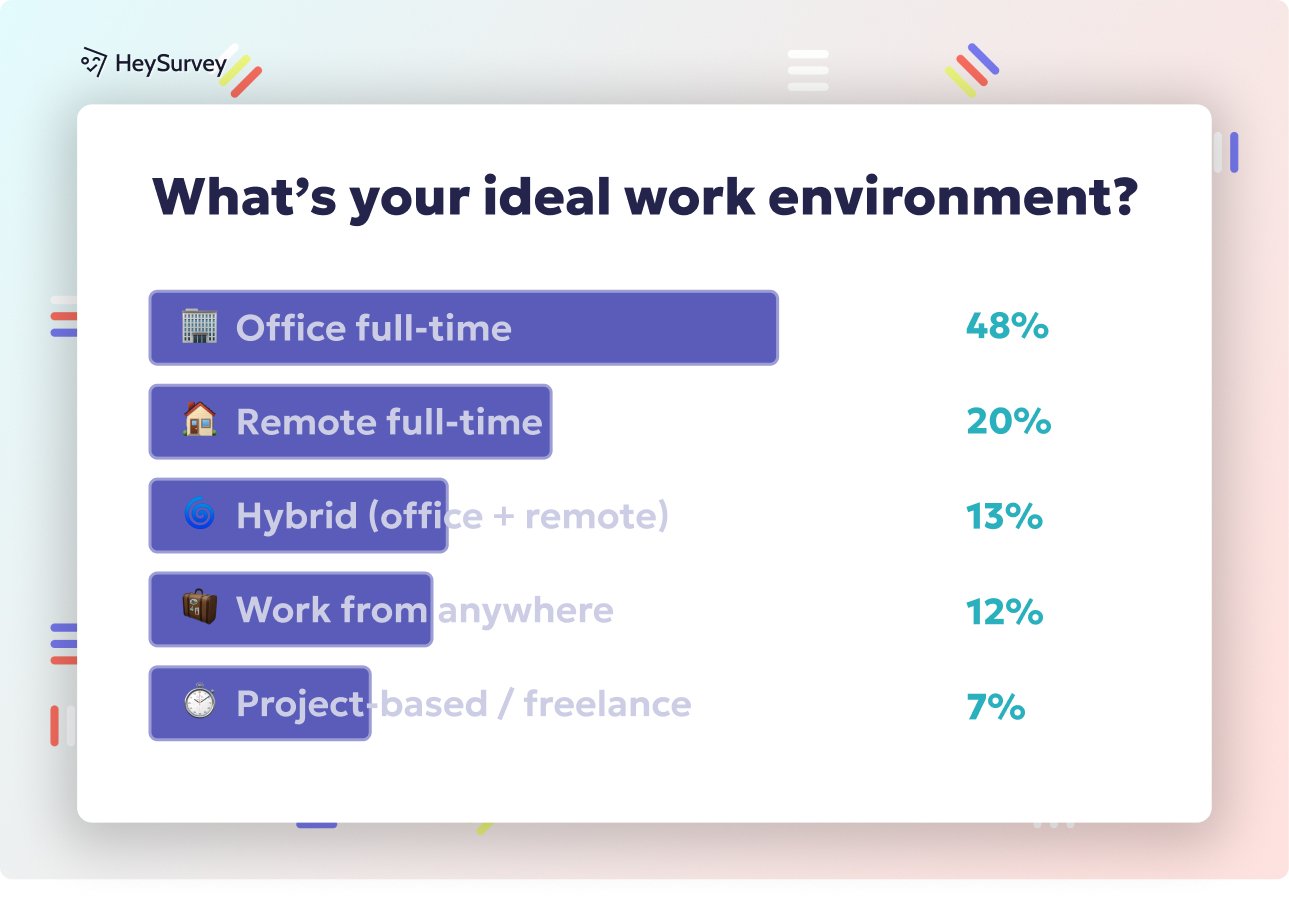
30 Rating Scale Survey Questions Examples to Boost Feedback
Discover 25+ rating scale survey questions examples with tips for Likert, numeric, star ratings, ...
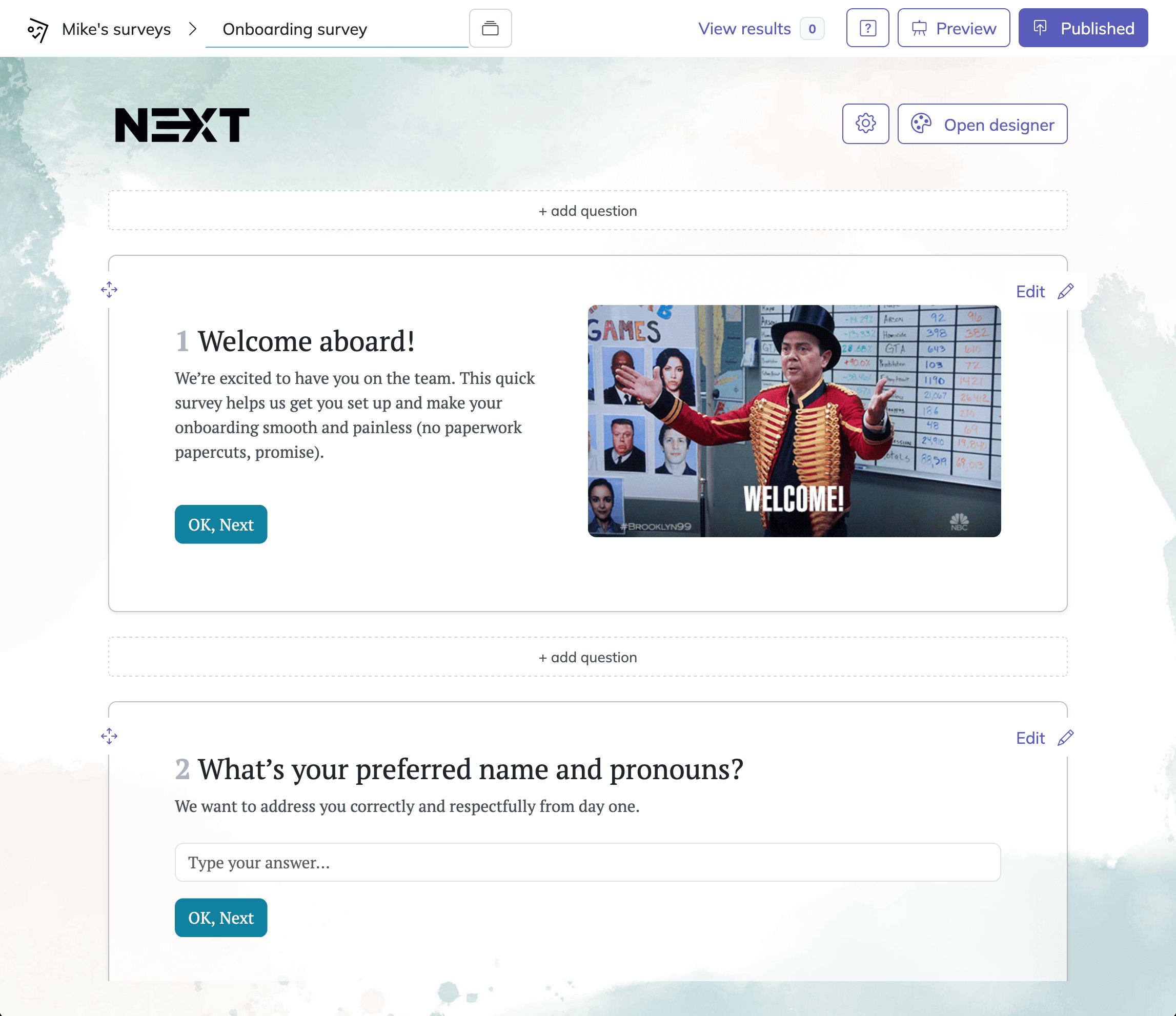
32 Likert Scale Survey Questions Examples: Ultimate Guide
Discover 25+ Likert scale survey questions examples and expert tips for crafting powerful, data-d...
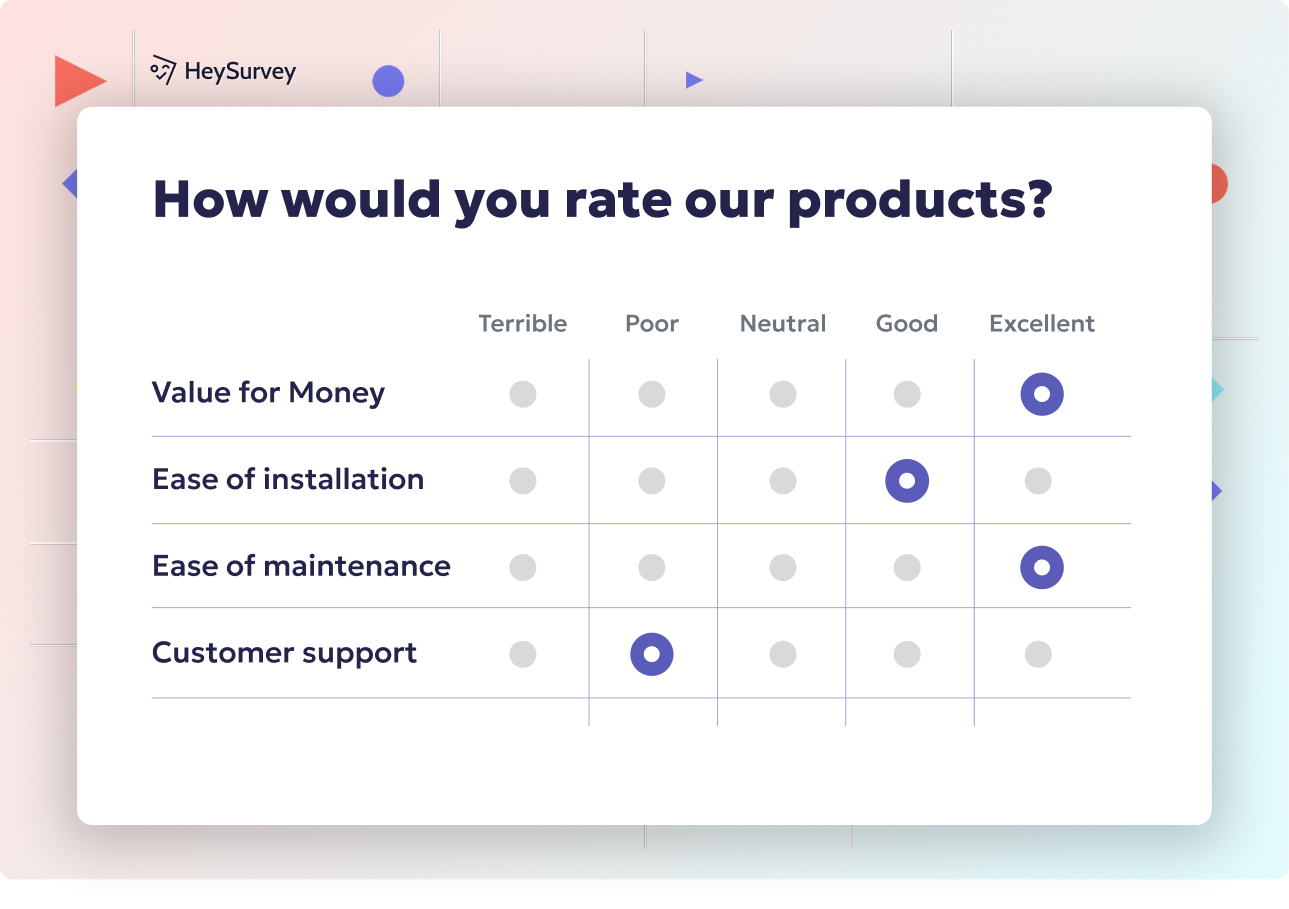
31 Expert Samples: What Is a Scale Survey Question Explained
Discover what is a scale survey question, explore 8 types with 30+ expert sample questions to mea...

